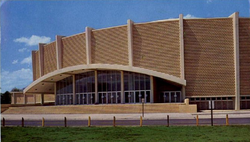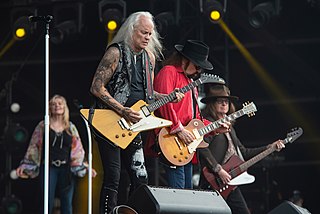
Lynyrd Skynyrd is an American rock band formed in Jacksonville, Florida. The group originally formed as My Backyard in 1964 and comprised Ronnie Van Zant, Gary Rossington (guitar), Allen Collins (guitar), Larry Junstrom, and Bob Burns (drums). The band spent five years touring small venues under various names and with several lineup changes before deciding on "Lynyrd Skynyrd" in 1969. The band released its first album, (Pronounced 'Lĕh-'nérd 'Skin-'nérd), in 1973. By then, they had settled on a lineup that included bassist Leon Wilkeson, keyboardist Billy Powell, and guitarist Ed King. Burns left and was replaced by Artimus Pyle in 1974. King left in 1975 and was replaced by Steve Gaines in 1976. At the height of their fame in the 1970s, the band popularized the Southern rock genre with songs such as "Sweet Home Alabama" and "Free Bird". After releasing five studio albums and one live album, the band's career was abruptly halted on October 20, 1977, when their chartered airplane crashed, killing Van Zant, Steve Gaines, and backup singer Cassie Gaines; and seriously injuring the rest of the band.

Ronald Wayne Van Zant was an American singer, best known as the original lead vocalist, primary lyricist and a founding member of the southern rock band Lynyrd Skynyrd. He was the older brother of Johnny Van Zant, the current Lynyrd Skynyrd lead vocalist, and Donnie Van Zant, the founder and vocalist of the rock band .38 Special.
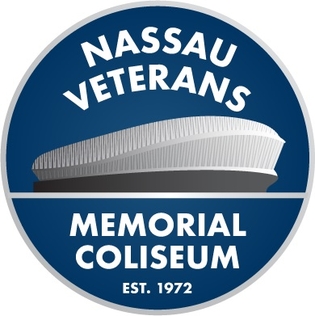
Nassau Veterans Memorial Coliseum is a multi-purpose indoor arena in Uniondale, New York, east of New York City. The Long Island venue is approximately 7 miles (11 km) east of the eastern limits of the New York City Borough of Queens, and is also next to the Meadowbrook Parkway.

The Greensboro Coliseum Complex, commonly referred to as Greensboro Coliseum, is an entertainment and sports complex located in Greensboro, North Carolina. Opened in 1959, the complex holds eight venues that includes an amphitheater, arena, aquatic center, banquet hall, convention center, museum, theatre, and an indoor pavilion. It is the home of the UNC Greensboro Spartans men's basketball team, the Greensboro Swarm of the NBA G League, the Carolina Cobras of the National Arena League, as well as the Atlantic Coast Conference (ACC) with their Men's and Women's basketball tournaments.
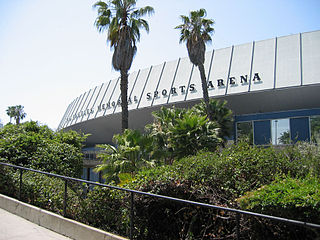
The Los Angeles Memorial Sports Arena was a multi-purpose arena at Exposition Park, in the University Park neighborhood of Los Angeles. It was located next to the Los Angeles Memorial Coliseum and just south of the campus of the University of Southern California, which managed and operated both venues under a master lease agreement with the Los Angeles Memorial Coliseum Commission. The arena was closed in April 2016, and was demolished in September of that same year. It was replaced with BMO Stadium, home of Major League Soccer's Los Angeles FC, which opened in 2018.

The Veterans Memorial Coliseum is an indoor arena located in the oldest part of the Rose Quarter area in Portland, Oregon. The arena is the home of the Portland Winterhawks, a major junior ice hockey team, and was the original home of the Portland Trail Blazers of the National Basketball Association. It has been included on the National Register of Historic Places in recognition of its architectural significance.

The Capital Centre was an indoor arena in the eastern United States, located in Landover, Maryland, a suburb east of Washington, D.C. The seating capacity was 18,756 for basketball and 18,130 for hockey.

Pensacola Bay Center is an indoor arena located in Pensacola, Florida. It is owned by Escambia County and operated by ASM Global. The Bay Center has a capacity of 8,049 for hockey games, and as much as 10,000 for non-hockey events. The arena contains 23,000 square feet (2,100 m2) of space and 10,000 square feet (1,000 m2) of meeting space.

Viejas Arena is an indoor arena in San Diego, California, located on the campus of San Diego State University. The arena is home of the San Diego State Aztecs men's and women's basketball teams. The Aztecs compete in NCAA Division I as a member of the Mountain West Conference (MW).

The Lawrence Joel Veterans Memorial Coliseum is a 14,665-seat multi-purpose arena, in Winston-Salem, North Carolina. Construction on the arena began on April 23, 1987, and it opened on August 28, 1989. It was named after Lawrence Joel, an Army medic from Winston-Salem who was awarded the Medal of Honor in 1967 for action in Vietnam on November 8, 1965. The memorial was designed by James Ford in New York, and includes the poem "The Fallen" engraved on an interior wall. It is home to the Wake Forest University Demon Deacons men's basketball and women's basketball teams, and is adjacent to the Carolina Classic Fairgrounds. The arena replaced the old Winston-Salem Memorial Coliseum, which was torn down for the LJVM Coliseum's construction.

VyStar Veterans Memorial Arena is a multi-purpose arena located in Jacksonville, Florida. It currently serves as the home arena of the Jacksonville Icemen of the ECHL, the Jacksonville Giants of the American Basketball Association, and the Jacksonville Sharks of the National Arena League.

Coleman Coliseum is a 15,383-seat multi-purpose arena in Tuscaloosa, Alabama, on the campus of the University of Alabama. It is the current home of the Alabama Crimson Tide men's and women's basketball and women's gymnastics teams, and previously served as the home of the women's volleyball program. Opened in 1968 as Memorial Coliseum as a replacement for Foster Auditorium, the coliseum is located at the center of the University of Alabama's athletic complex, which also includes Sewell-Thomas Stadium, Sam Bailey Track & Field Stadium, the Hank Crisp Indoor Facility, the Mal M. Moore Athletic Facility and the football building and practice fields.
Cadence Bank Arena, formerly Tupelo Coliseum, BancorpSouth Center and BancorpSouth Arena is a 10,000-seat multi-purpose arena, near downtown Tupelo, Mississippi, named for the locally based Cadence Bank, a large multi-state commercial banking company.
Barton Coliseum is a 7,150-seat multi-purpose arena located within the Arkansas State Fairgrounds in Little Rock, Arkansas. The coliseum was dedicated on September 29, 1952, in honor of Thomas Harry Barton, founder of Lion Oil.

Freebird Live was a music venue located in Jacksonville Beach, Florida. They closed their doors with a final concert on January 21, 2016.

Bayfront Center was an indoor arena located in St. Petersburg, Florida that hosted many concerts, sporting and other events. Depending on the configuration, it could hold up to 8,600 people. The arena was opened in 1965 and demolished in 2004. It adjoined the Mahaffey Theater, which is still standing.

Greenville Memorial Auditorium was a 7,500-seat multi-purpose arena built in 1958 that was located in Greenville, South Carolina. It hosted local sporting events, concerts and the Ringling Brothers Circus until the Bon Secours Wellness Arena opened in 1998.

Spokane Coliseum was an indoor arena in the northwestern United States, located in Spokane, Washington. Opened in late 1954, it had a seating capacity of 5,400.
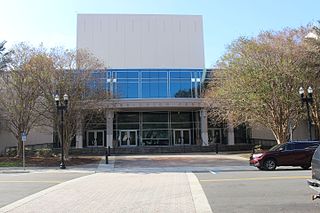
The Jacksonville Center for the Performing Arts (JCPA) is a performing arts center located in Jacksonville, Florida. Situated along the Riverbank, the venue is known as the First Coast’s "premiere riverfront entertainment facility". Originally opening in 1962, the facility was renovated beginning in 1995 until 1997; with a grand re-opening on February 8, 1997. The center consists of three venues: a theatre; concert hall and recital hall. It is home to the Jacksonville Symphony, Jacksonville Symphony Youth Orchestra, and the FSCJ Artist Series.
Freedom Hall Civic Center is a multi-purpose arena in Johnson City, Tennessee.
